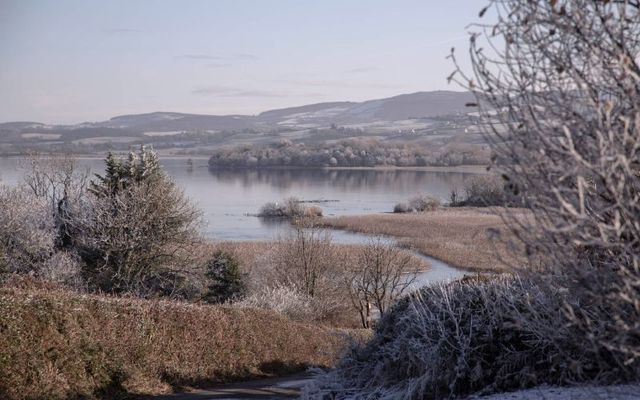The one thing you can say with some certainty about that troubled island is it's about 46F and your clothes are damp. Other times, it's so gobsmackingly lovely with all the world's weather passing over for all to see. Vistas too lovely for canvas. The scent of smoldering turf from the cottage chimneys, a Druidic incense from a time before St. Patrick. The smell of tide-beached kelp and the taste of the sea in the air, sensual memories that when you go from there, you may from then on ever miss.
One October morning, I came out of a guest house in the West of Ireland to a world of hoar frost, and a silence so thick you could hear your own heart beating.
The sky was a pewter curtain, the road an onyx causeway, the stone walls appeared soft like clouds come down to border carpet fields of heather, moss, furze, and the harvest-turned dirt clods shining silver with dew.
All of the trees and bushes were crystal, their leaves heavy with diamonds perched to drip.
We leaned on the fender of the car speechless and waited for it all to dissolve, melt, or vanish.
A cawing from out of sight, and then a parliament of magpies rushes over. One for sorrow ... two for joy ... three for a girl ... four for a boy.
We’re both counting and at six for gold we think it means everything, all combinations, or nothing.
Then seven for a secret never told.
In that short time, the curtain parts, the sun emerges and throws color everywhere, the drops fall and splash silently, a breeze becomes a gust, as if to say “enough” and clocks begin to tick again.
The day before, we had visited the Cliffs of Moher. Lovely green fields that end abruptly in midair, the cliffs stark and frightening in their sheerness. It’s as if in some epoch past a large part of the island cleaved itself like an iceberg calf and floated away, taking what might have been the best land with it. It could have gone from sight in the mists and become T’ir na nO’g, the land of eternal youth, or maybe just kept going and later was called Brooklyn.
For all its wild beauty, the aura of an old magic and the cruel architecture of poverty, it is a lovely place, and while what my mother said is so very true; the empty, collapsed cottages, like headstones for ancient giants, attest to it; you cannot eat the scenery, but ... you do not forget the taste of it.
“Failta’ (October 1976) T.P. Dunne
This article was submitted to the IrishCentral contributors network by a member of the global Irish community. To become an IrishCentral contributor click here.




Comments